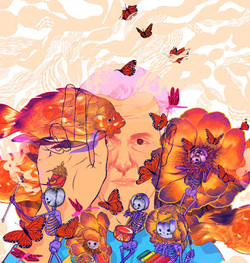Symptom finder - The causes of hallucinations

Symptom finder - The causes of hallucinations
There are many causes of hallucinations. The common causes of hallucination are severe medical illness ( chronic renal failure, chronic liver failure), drugs or drugs withdrawal ( overdose of tricyclic antidepressant, amphetamines, sniffing of solvent, ecstasy , LSD, cocaine and marijuana), bereavement reaction, neurological disorders ( nacrolepsy, dementia post concussional state, tumor of the cerebrum and temporal lobe epilepsy ), alcohol ( alcohol withdrawal /delerium tremens, alcoholic hallucinations), metabolic disturbance ( hypothyroidism, diabetic ketoacidosis), psychiatric disorder ( mania, post traumatic stress disorder, psychotic depression and schizophrenia ), hypoxia, extreme fatigue and sensory deprivation ( deafness and blindness).
What is hallucinations? It is an apparent perception of sensation of an external object when no such object is present. Illusion is a misinterpretation of a real perception.It is important to differentiate hallucination from illusion.
A clear description of hallucination is important. The patient may seeing objects, beings, lights and pattern that are not there. The patient may also complain of crawling sensation on the skin or hearing voices that are not there. In certain cases, patient may feel the smell or taste that are not there. These pure olfactory hallucinations are commonly associated with temporal lobe epilepsy. Children and elderly who suffer from acute onset of febrile illness may also develop hallucinations. Psychotic condition such as schizophrenia may also cause auditory hallucinations. In certain case such as bereavement reaction, hallucination may be normal. It is important to take a full drug history such as any intake of recreational drugs or any history of alcohol withdrawal or alcohol abuse which may present with tactile hallucination.
On examination, look for signs of infection. Monitor the temperature . Observe for any signs of kidney failure or renal failure. Full mental state examination is performed for any possibilities of psychiatric disorders as well as full neurological examination for exclusion of any space occupying lesions.
The investigations require are full blood count, urea and electrolytes, liver function test, blood sugar, urinalysis, arterial blood gases, CT scan , toxicology screen and EEG.
Full blood count may reveal raise in white cell count due to infection or raise in mean capsular volume ( MCV) in excessive intake of alcohol. Urea and electrolytes may reveal renal failure or metabolic disturbance . Liver failure is identified with liver function test. Blood sugar measurement is useful in case of hyperglycemic ketoacidosis. Hyperglycemic ketoacidosis and urinary tract infection can also be detected with urinalysis.
Toxicology screen is performed to identify any drug abuse. Arterial blood gases is performed to rule out any metabolic disturbance and hypoxia. EEG is useful to detect the present of temporal lobe epilepsy. CT scan may detect any space occupying lesion and to identify the causes of dementia.
There are many causes of hallucinations. The common causes of hallucination are severe medical illness ( chronic renal failure, chronic liver failure), drugs or drugs withdrawal ( overdose of tricyclic antidepressant, amphetamines, sniffing of solvent, ecstasy , LSD, cocaine and marijuana), bereavement reaction, neurological disorders ( nacrolepsy, dementia post concussional state, tumor of the cerebrum and temporal lobe epilepsy ), alcohol ( alcohol withdrawal /delerium tremens, alcoholic hallucinations), metabolic disturbance ( hypothyroidism, diabetic ketoacidosis), psychiatric disorder ( mania, post traumatic stress disorder, psychotic depression and schizophrenia ), hypoxia, extreme fatigue and sensory deprivation ( deafness and blindness).
What is hallucinations? It is an apparent perception of sensation of an external object when no such object is present. Illusion is a misinterpretation of a real perception.It is important to differentiate hallucination from illusion.
A clear description of hallucination is important. The patient may seeing objects, beings, lights and pattern that are not there. The patient may also complain of crawling sensation on the skin or hearing voices that are not there. In certain cases, patient may feel the smell or taste that are not there. These pure olfactory hallucinations are commonly associated with temporal lobe epilepsy. Children and elderly who suffer from acute onset of febrile illness may also develop hallucinations. Psychotic condition such as schizophrenia may also cause auditory hallucinations. In certain case such as bereavement reaction, hallucination may be normal. It is important to take a full drug history such as any intake of recreational drugs or any history of alcohol withdrawal or alcohol abuse which may present with tactile hallucination.
On examination, look for signs of infection. Monitor the temperature . Observe for any signs of kidney failure or renal failure. Full mental state examination is performed for any possibilities of psychiatric disorders as well as full neurological examination for exclusion of any space occupying lesions.
The investigations require are full blood count, urea and electrolytes, liver function test, blood sugar, urinalysis, arterial blood gases, CT scan , toxicology screen and EEG.
Full blood count may reveal raise in white cell count due to infection or raise in mean capsular volume ( MCV) in excessive intake of alcohol. Urea and electrolytes may reveal renal failure or metabolic disturbance . Liver failure is identified with liver function test. Blood sugar measurement is useful in case of hyperglycemic ketoacidosis. Hyperglycemic ketoacidosis and urinary tract infection can also be detected with urinalysis.
Toxicology screen is performed to identify any drug abuse. Arterial blood gases is performed to rule out any metabolic disturbance and hypoxia. EEG is useful to detect the present of temporal lobe epilepsy. CT scan may detect any space occupying lesion and to identify the causes of dementia.
